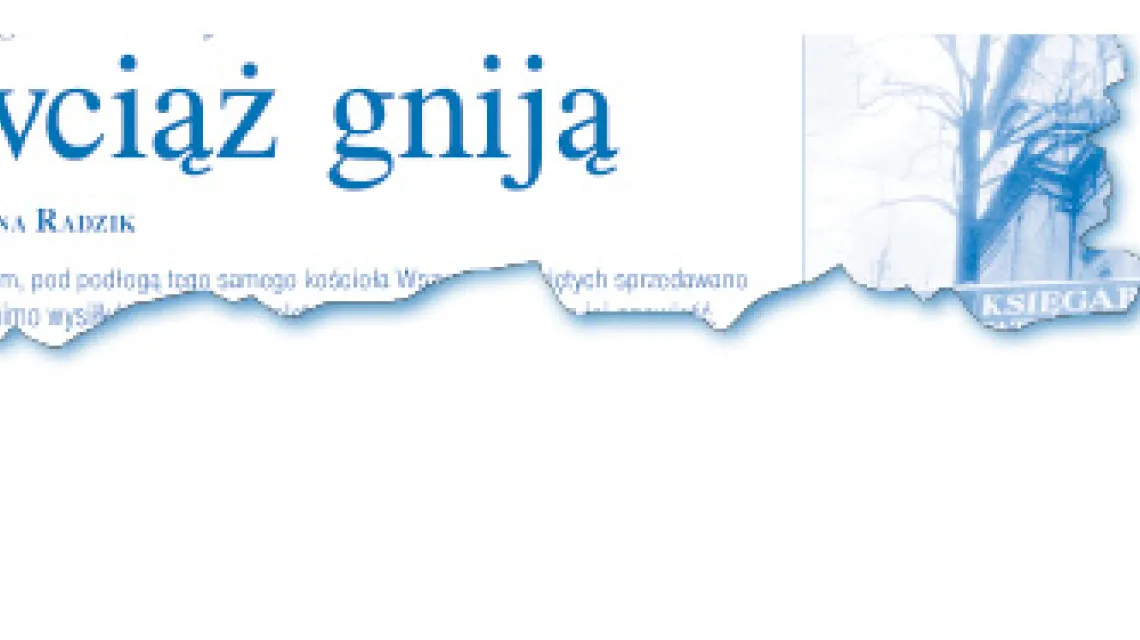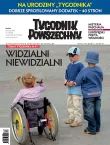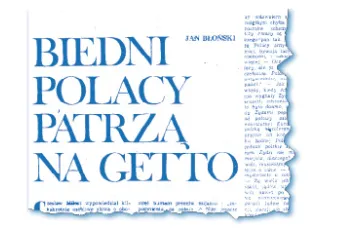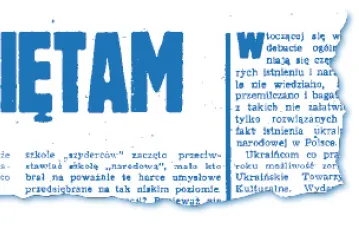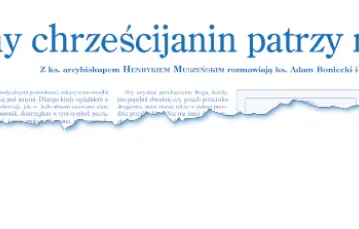Wykupienie dostępu pozwoli Ci czytać artykuły wysokiej jakości i wspierać niezależne dziennikarstwo w wymagających dla wydawców czasach. Rośnij z nami! Pełna oferta →
Zuzanna Radzik’s text appeared in Tygodnik Powszechny No. 13/03, while issue No. 49/03 carried an open letter from Catholic intellectuals to the Primate of Poland (also published by the Catholic Information Agency and in the daily press). “We do not understand why hate propaganda is permitted on church property. We are scandalised by this permission, which may be interpreted precisely as Church approval for the views presented there," wrote the authors, among them Władysław Bartoszewski, Father Adam Boniecki, Bohdan Cywiński, Leon Kieres, Tadeusz Mazowiecki, Jan Nowak-Jeziorański, and Father Jan Twardowski. “This has already been handled by the public prosecutor’s office and I do not wish to impose anything that could limit freedom of speech," replied Cardinal Glemp (the public prosecutor’s office launched an investigation concerning the books sold in the Antyk bookshop, but this was discontinued after the owner, authors and publishers denied that their intention had been to “insult any group of people due to their nationality or religious affiliation or incite hatred for these reasons"). The bookshop only disappeared from the basement of All Saints’ Church after a new priest was appointed in September 2006; the new parish priest opened an “ordinary" Catholic bookshop there.
It all started in May 2001 at a meeting held by the “Więź" Association concerning the Dabru Emet (a declaration published by a group of Jewish scholars from the US calling on Jews to revise their thinking about Christians and Christianity). This was the first time that someone had mentioned the Antyk Patriotic Bookshop in the basement of the All Saints’ Church on Plac Grzybowski in Warsaw. When I visited the synagogue and Lauder Foundation on ul. Twarda, which is a stone’s throw from Plac Grzybowski, I went there to have a look. I had no idea it would be that horrible. There were lots of books and periodicals there that could be described as anti-Semitic, xenophobic, anti-EU, and even anti-Church (e.g., containing wild speculations about bishops). Among them was the Szczerbiec monthly (which is read, according to my friends, mostly by skinheads). This was complemented with “politically correct" T-shirts and posters. Overall, the bookshop made a terrible impression on me, but I thought that since so many important and influential people had been at the meeting and had heard about the bookshop, something would certainly be done. So, I was astonished when after the prayers for the Jedwabne victims (the penitential service held by the Primate of Poland and bishops took place at the church directly above the bookshop), I still saw those books there. At the time, it did not occur to me that I should do something. Later, I heard some bitter complaints about the Church from my Jewish friend who had learned about the bookshop and wanted to talk with the priest of that parish about it.
Parish Priest
I was due to leave that day, so it was only after I had returned from my holidays that I learned he had got nowhere: the conversation had ended with an “Amen." Anyway, I felt guilty going on holiday - I should have gone to the parish priest myself, this should have been my first reaction. So, later, I decided to go and talk to him, too - perhaps the priest was irked by a Jew coming to see him, whereas I am a Christian, after all. I would be very nice to him and everything will be OK, I thought. Well, I was indeed very nice, but it was not OK. The priest spoke to me through the entryphone and once again finished the conversation with an “Amen." His main arguments were that the basement was rotting and something had to be done about it and that it was not his job to impose censorship. Moreover, he had already explained on the radio that these were rented premises and not a church bookshop. Regrettably, what I heard was aggression instead of gentle argument. This was the first time someone had spoken to me like that - and this was a priest. My friends triumphed, seeing this as proof of the Church’s hypocrisy.
Needless to say, my Jewish friends see all friendly gestures on my part as private; for them, this bookshop expresses the Church’s official standpoint.
Curia - the First Time
Confident that this was not the real face of the Church, and armed with my knowledge of its official standpoint on Christian-Jewish relations, I went to the Warsaw Metropolitan Curia. I expected resistance but met with understanding on the part of the Director of the Catholic Teaching Department. I handed him a letter describing the entire affair and it looked as if the problem might be solved. The Director asked me to be patient “because it might take as long as three months if the lease has to be terminated." I was in no hurry - I had my school exams coming up and many other things to worry about. Moreover, I trusted everything would be taken care of.
After a few weeks, however, I learned that Bishop Tadeusz Pikus had thought it necessary to forward my clumsily written letter to the Primate of Poland, and thus my first interlocutor from the Curia could no longer oversee the matter or influence its course.
Curia - the Second Time
Having read Father Tomasz Węcławski’s Świadectwo [Testimony] and checked that the bookshop was still thriving, I decided to try a new approach, since three months had passed and the Curia had done nothing. After consulting my “guardian angel" (a youth chaplain I met by chance at Judaism Day in Lublin), I decided to speak to the bishop himself instead of the Departmental Directors (grand as these titles might sound, I had the impression that they would not so much as lift a finger without the bishop’s consent).
When I called, the switchboard put me through to Bishop Piotr Jarecki. He allotted an audience for me, but unfortunately the date coincided with my Polish A-level exam. I asked for the date to be changed and explained the reason. Apparently, this was a mistake; when I called the next time, it was suggested that I meet the Pastoral Department Director first. This is what I did. After a very pleasant, long conversation I was inclined to believe that I had met with understanding again. However, when the Director said that I should write a letter, I responded that I already had - three months earlier. At that point, my interlocutor - and myself as well - ran out of ideas.
Collecting Signatures
Another piece of advice my “guardian angel" gave me was to write letters to the Primate. At the time, I was already active at the Dominican university chaplaincy on ul. Freta, co-organising meetings between Jews and Christians; collecting signatures was not a problem. It was in May 2002, in the middle of my exams - I do not remember exactly when - that the letter was written. Our chaplain, Father Wojciech Czwichocki, approved its wording. However, in order to get a better response, I decided to forge a coalition. As a result, we collected signatures at ul. Freta 10, at another Dominican chaplaincy (“Służew nad Dolinką"), at the chaplaincy run by the Jesuits on ul. Rakowiecka, and at the Warsaw Catholic Intellectuals’ Club (where the letter was signed not only by the members but also by the board). Some collected signatures amongst their friends (my appreciation and thanks go to Father Wojciech Czwichocki, O.P., Father Ryszard Bosakowski, O.P., Father Tomasz Ortmann, S.J., and Piotr Cywiński). For me, it was the time of my A-levels and preparation for entrance exams, while others were sitting their summer university exams. So we did not exert ourselves too much - the idea was not to get thousands of signatures but rather to make a stand. After all, the issue seemed so clear-cut… In total, we had around 200 signatures.
Immediately after Mass we collected signatures at the Freta chaplaincy and then attended a concert called “Towards Common Europe with Music and Hope." Well, someone put two and two together and an article by Ewa Polak-Pałkiewicz appeared in the Nasz Dziennik daily about young people who had been manipulated by Euro-Socialists into campaigning against “the best Catholic bookshop"; in the author’s opinion, the manipulators resorted to tried and tested Communist methods. The whole thing would have been quite hilarious had it not been for two calls I received from supporters of the bookshop (I had put my phone number on the poster advertising the collection of signatures at the chaplaincy). I admit these conversations made a strong impression on me, but they also strengthened my resolve.
Curia - the Third Time
I do not remember who suggested it or when, but finally a decision was made to request an audience once again. I submitted a letter briefly explaining the matter and the Curia said it would call back. I waited for two weeks but no answer was forthcoming. In the end, I called myself and had the (dubious, I must say) pleasure of speaking with the Curia’s Chancellor. In a brusque and at times aggressive way, he informed me that the Curia had more important things to think about, that the Primate had decided not to grant an audience, and that, therefore, the matter was closed. He was not interested in the letters we had signed and sent to the Primate - they knew what the whole matter was about and did not need any letters. This, of course, is a toned down version of what I really heard. I can usually control myself, but I burst into tears; my sister thought that someone had died or something terrible had happened. I had not expected to hear that kind of tone or such arguments. No one had ever dismissed me like that. But it was not just me - a protest by almost 200 people concerning a fairly important issue had been dismissed. Moreover, if the Primate had really said that the matter was closed, as the Chancellor told me, then that was really the end - like Anne of Green Gables, I was in the depths of despair.
An hour later, still wiping the tears from my face, I decided to phone Bishop Pikus, who had ostensibly forwarded my first letter to the Primate. I got no understanding there, either - the bishop told me to pray and hope; he shared my concerns about the bad books which were to be found everywhere;
I fear, however, that we did not have the same books in mind.
This conversation pushed me back into the depths of despair and floods of tears once again. All our efforts had been in vain. The sceptics had been right all along; it was I who was na?ve, with my “stupid faith in the Church."
Mr Nosowski advises, Rzeczpospolita writes
A friend from Kraków suggested that I contact Zbigniew Nosowski [Editor-in-chief of Więź] because he knew the ins and outs of the Church very well and a conversation with him might soothe my nerves.
We met a few days later in the office of the Więź monthly. The conversation did indeed help me to calm down, although Mr Nosowski made it quite clear that the chances of a satisfactory resolution to the matter were slim. We decided, however, that the letters the Curia had declined to accept should be sent by registered mail together with a covering letter and a selection of extracts from the books sold at the bookshop. It was choosing these passages that proved most difficult; I borrowed the books (so as not to buy them) from people who already had them
(I bought one myself: Stanisław Wysocki’s Antypolonizm Żydów polskich [Polish Jews’ Hatred Towards Poland]; it was not a reprint from the 1930s but a brand new book from 2002). This was not the most pleasant thing to do during the holidays and the work proceeded very slowly, since I had neither the time nor the inclination to read such stuff, but by August I finally had a fairly representative set of quotes. Piotr Cywiński sent all this by registered mail to the Primate’s secretariat.
At the same time, Piotr, with my approval, managed to get the Rzeczpospolita daily interested. In September, I was contacted by the journalist Aleksandra Cisłak, who had decided to write an article about the matter. The problem was that I was to be mentioned by name; I was just beginning my university studies, and at the Faculty of Theology to boot! I feared this was not a very auspicious start, but fortunately no one read the article too closely and my name went unnoticed. At the end of the article, the author quoted Bishop Pikus, who promised to deal with the matter. We decided to take him at his word, the more so as the interview was authorised.
The Professors’ Letter
Initially, we were astonished by the complete lack of response to the article - total silence. Father Czwichocki thought this was because of the elections. He was right - it was not till two months later, following the second round of the local elections, that the Nasza Polska weekly commented on the Rzeczpospolita article.
There was also a letter expressing support for the bookshop signed by some professors, mainly from the United States. I have seen this letter - it is still posted on the door of the bookshop. I have not heard of any of the authors and I do not know if they really are professors. Anyway, they claim that the bookshop is not anti-Semitic but rather presents “the true history of Jewish hatred towards Poland." Naturally, their arguments refer to my age as well. The journalist from Rzeczpospolita does not know or understand many things either - she is too young, and students are easy to manipulate, so their protests are nothing to worry about. The age argument seems to be a recurring one in this debate.
Curia - the Fourth Time
At the beginning of December, I decided to check what Bishop Pikus had done to deal with the matter during the previous two months. I called, but the conversation was rather short; at some point, the bishop said goodbye and hung up. This was so unexpected that - dare I say it - he just slammed the receiver down.
This end to our conversation made an impression on me, since it showed that the Church route was definitively closed. Perhaps this route had already closed in June, and I was just deluding myself that a letter sent by registered mail or a Rzeczpospolita article could change something. In fact, the conversation neatly summed up the atmosphere that had accompanied the whole affair. At the same time, it was a difficult experience, because I am not used to ending conversations in this manner, especially with bishops. The next day, I wrote a conciliatory letter to the bishop and submitted it to the Curia. I received no reply.
Still, I Am Right
From the outset, I was thoroughly convinced that I was right: an anti-Semitic, anti-Church, xenophobic, and generally horrible bookshop should not operate in a church basement. Technically, it was not a church bookshop, so the bishop and the parish priest did not think anything was amiss, but people in the street knew nothing of these formalities and the association was clear. Let us be frank: if someone had really taken offence to those books, they would have been removed long ago.
I stressed all the time that the protest was not just about defending Jews and opposing anti-Semitism. As I mentioned earlier, the bookshop is, in fact, also anti-Church. In all my letters to the Curia, I emphasised that my aim was to protect the reputation of the Church and my brethren who were being manipulated by these publications. The fact that the books are being sold in a church basement gives credibility to their claims. Is there really no one at the Curia who understands this simple connection? It’s hard to believe. In fact, it is precisely the readers of these books who are being deceived the most.
Many people told me I would fail, that I wouldn’t be able to beat the system, that money might be involved. They said I had no chance and I refused to believe them. I argued that if everyone thought that way, nothing would change. Silence implies consent. I thought that something that flew so flagrantly in the face of the Gospel had no place in the Church. I continued to believe this even after my telephone conversations with the Curia in June, although by then I knew things would not be easy. I continued to harbour some hope even in November. I lost it when, one week after Bishop Pikus had slammed the phone down, Zbigniew Nosowski called to express his “helpless solidarity." If he did not know what to do next, how could I?
The Episcopate Speaks of Dialogue
After the meeting of the Episcopate in November 2002, a letter on dialogue was issued. It said that it was necessary to look after monuments - remnants of other religions, cemeteries, Orthodox churches and synagogues, and to oppose hate-filled graffiti and chants at stadiums. But what about books and newspapers? What should I think of people who write such a letter and neglect such an important issue in their own diocese? As Aleksandra Cisłak from Rzeczpospolita learned, the Antyk Foundation that runs the bookshop has the right to use the basement for five years in exchange for renovating it. I have no doubt that the lease will be extended. I understand that were the Church to terminate the lease, the costs of the renovation would have to be reimbursed - but does honour come free? Especially that a new organ has just been installed in the church. How much does a new organ cost? I know these are questions that could be asked by the worst anti-clericalists, but whenever I pass the church I want to ask them.
If I cry at night, it should be because of unrequited love rather than because of a bishop. I know that the Church is both holy and sinful, but I thought it had more good will. After all, it is not a post office or a tax office. Father Tischner once said that meeting one’s own parish priest could drive one to lose faith. The problem is not that I was personally hurt. The problem is that things are not how they ought to be. I have this feeling deep inside me now and it is difficult to describe.
Postscript. In February 2003, Polish television broadcast Barbara Czajkowska’s interview with the Primate of Poland, Cardinal Józef Glemp, who said that he had never received any signed letters concerning the Antyk Patriotic Bookshop.
Zuzanna Radzik (born 1983) is a theologian; she graduated from the Bobolanum Pontifical Faculty of Theology and is currently continuing her studies at the Hebrew University of Jerusalem. She is a member of the Polish Council of Christians and Jews and of the Ethnographic Archive research group headed by Professor Joanna Tokarska-Bakir.


